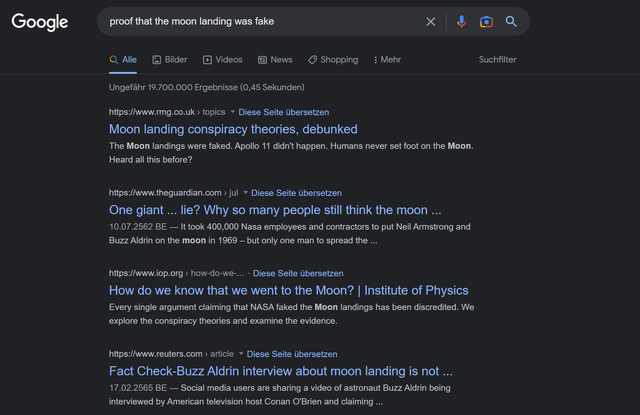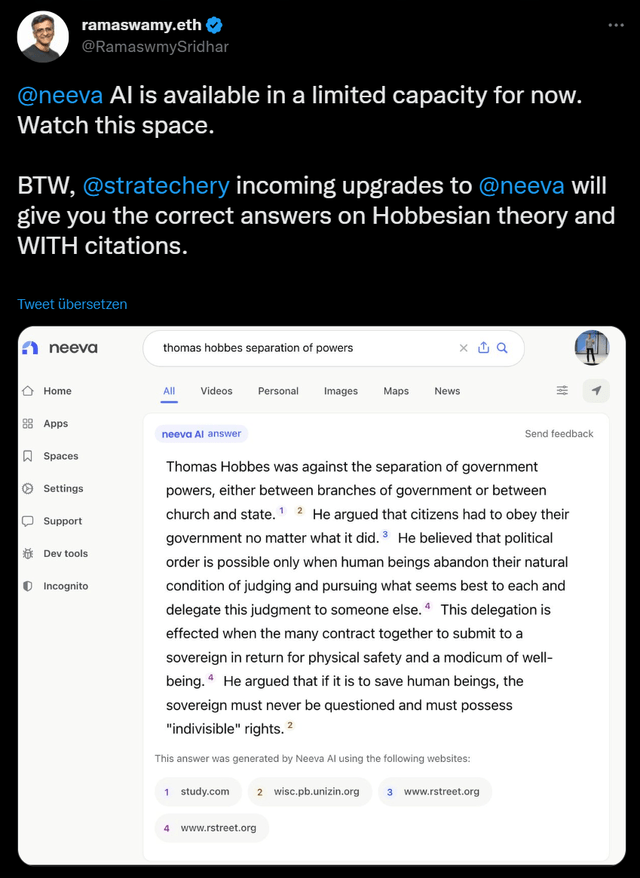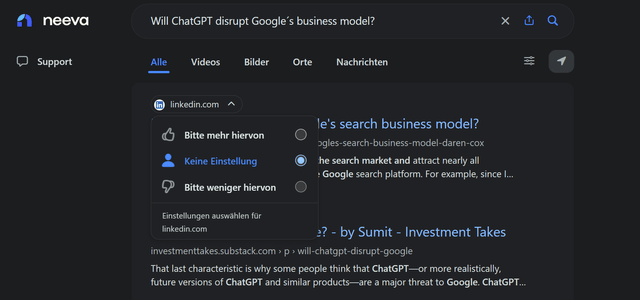Summary:
- The danger of disruption is real, and I think overdue.
- The apps that make money (Google and YouTube) are, in my opinion, not innovative; perhaps even the opposite.
- I think that Google has little interest in change and has hardly changed the cash cow apps for years. But I do not believe that this can go on forever.
Prykhodov
Thesis
In recent weeks there has been a lot of buzz and articles about ChatGPT and how it may disrupt Google (NASDAQ:GOOG) (NASDAQ:GOOGL). This danger is real, and I think overdue. Google is resting on its cash cows, and these have mostly stayed the same over the years, and some have even gotten worse. So it is unclear, but also irrelevant, whether the disruption will come from ChatGPT or someone else.
Google has not been innovative for a long time
In his book “The innovator’s dilemma,” Clayton Christensen explains why disruptions often come not from the dominant companies but from the smaller competition. One of the reasons is that every company wants to maintain its own dominant market position. A company that is the world market leader in the production of CDs has no interest in inventing the MP3 player. Even if the potential is recognized, the risk would be too great to burn money or not be the market leader in the new market. There are many historical examples of this, which is one of the reasons why no tech company has ever been among the top 5 most valuable companies in the long run.
There is no question that Google offers many good products and has followed a clear pattern: starting with Google Search, it has expanded its offering more and more to create a whole network of apps that work together. The wide range of apps makes up Google’s moat if you can even call it that. For each of the well-known Google apps, there are numerous alternatives. As a result, I can’t think of any app that is truly unique or not reproducible: What is harder to reproduce, however, is the breadth of apps that complement and extend each other.
When was the last time Google released something really innovative? This is a serious question; if you know something, could you write it in the comments? It’s hard to keep track of all the Google applications, but I can’t think of anything. My only ideas are particular areas from the “other bets.” Therefore, I have already written articles in the past (which I strongly recommend reading) that dive deeper into Deepmind and Waymo. Waymo could be called disruptive, but they also have no moat and a lot of competition. On the other hand, Deepmind, an AI company, could be the most innovative that Google has up its sleeve. See my linked article for examples.
The weaknesses of the Google cash cows
However, the apps that make money (Google and YouTube) are, in my opinion, not innovative; perhaps even the opposite. Google still works very similarly to it did 20 years ago, with the difference that there is now significantly more advertising. For my taste, it is not user-friendly if the first 4 or 5 results contain only advertisements. Wasn’t it supposed to be the principle that every searcher should get the best possible results? I can’t see that anymore. Also, there is some censorship, and the algorithm seems to favor mainstream media. It looks like only certain views are permitted. The rest just don’t show up in searches, at least not as top results. Below is an example. And it’s not about what you or I think about the moon landing; it’s about the principle of paternalism. So my search query is that I want to know what evidence there is that the moon landing was faked. But the results are not about that at all. So if there were evidence against the moon landing, I would never find it.
YouTube has an infinite number of great videos, not because of YouTube itself but because of its users and channels. As soon as they upload their videos elsewhere, YouTube no longer has a unique selling point. Odysee, for example, offers synchronization so that videos are automatically uploaded to Odysee as well.
So why do so many still use Google and YouTube? For one thing, the company positioned itself tactically very cleverly in the early smartphone days. And even today, an Android smartphone is designed to use all Google services almost from the start, and since everyone has Google accounts, that’s what people do. Moreover, it is simply a habit. Many users have been using Google and YouTube for ten years and more. One has become accustomed to it and to change habits often needs a reason and a period of conscious willpower. I also observe this with myself. I want to use Google’s products less, but I often fall into old patterns and open Chrome, Maps, or YouTube, especially when I use the smartphone quickly and semi-automatically.
Overall, I find the Google user interface outdated and think it will soon be about time the company changes some things. Typing is slow and annoying. The results are riddled with advertising and censorship. This is not what the optimal Internet search function looks like.
Who is disrupting Google?
Recently there have been many discussions about ChatGPT, but who will disrupt Google, in the end, is not yet clear and doesn’t even matter. ChatGPT, in its current form, certainly does not. ChatGPT was trained with data from the past and does not work for current events. That alone is a criterion for exclusion as a Google alternative.
But one day, this could change, and the system could be fed with new real-time information at any time. Already next year, the next version should be published. GPT-3 (the current basis of ChatGPT) to GPT-4, and this should not be imagined as a minor update of an app but as a quantum leap. Microsoft’s CTO calls 2023 “the most exciting year that the AI community has ever had.” And he probably has information that we don’t have yet because Microsoft is a significant investor in OpenAI.
Neeva – a mix between Google and ChatGPT
Neeva takes an interesting approach, as here, a summary answer is created from various sources. Below the result, you can see the sources as footnotes and which part of the answer came from where.
However, this is not publicly accessible so far but looks more like a typical search engine. But even here, there are already exciting functions that I would use frequently. For example, linkedin.com is in first place for this search query. I can select whether I want to see more or less of this source in the future via a small dropdown menu. So the user could personalize his search results in the long run and hide websites more and more.
The question of monetization
Perhaps sites like ChatGPT or Neeva don’t yet know how to monetize this other form of information delivery. I don’t know either, but I’m sure there are also monetization opportunities where there are many users. I believe the future of the Internet is information transfer through digital interlocutors. But Google now seems like a static machine. There are no personalization options either. You get the impression that it’s all about maximizing advertising revenue and finding the “right” (politically correct) information.
Strangely, Google had already taken such a path with Google Assistant. But it never had the quality of ChatGPT. At best, it was good to tell me the weather for tomorrow. And it doesn’t look like they want to push the Assistant to be used more or even to replace Google. This may be due to the monetization issue. Ads as text, embedded in search – that’s the business model. But how do you monetize a voice assistant?
And that brings me back to the beginning of this article. I think that Google has little interest in change and has hardly changed the cash cow apps for years. But I do not believe that this can go on forever. Google is in a quandary. On the one hand, it needs money from the cash cows for research and the many well-paid employees. On the other hand, there is a danger that ChatGPT, possibly together with Microsoft, will create a real alternative to Google. Because one thing is clear: Google Search is not the last technological achievement of mankind. AI, brain chips, and human-machine networking are just beginning.
Conclusion
Google needs to adapt to reality and not the other way around. And this reality consists not only of technical innovations such as the ever-improving language models but also of what people want. In essence, an Internet search is simple: the searcher wants the best answer to his or her search. What people don’t like, however, is excessive advertising and paternalism. If a company goes down this path too strongly, it will only work for a while, in my view. Over time, however, more people will turn away and use alternatives. Whether ChatGPT or anyone else, I think the competition has the opportunity to disrupt Google in the next few years because Google has changed too little for too long. And that is a good development for the user and the internet as a whole. Strong competition forces improvements.
Of course, all this does not mean that Google will soon stop earning money or shareholders will no longer make money with their shares. With the current revenues, there are still enormous funds for research or buybacks. In addition, there is potential from the other bets. For this reason and the current favorable valuation, I remain with a buy rating, just as in my other articles that have highlighted individual aspects of the company. By the way, I wrote another article examining whether Google has reached its zenith in terms of users. Because part of the rapid growth of the last 20 years came from the tailwind that there were more and more Internet users. So from my point of view, Google is still a buy with which you will probably make money as a shareholder over the next five years. Personally, however, I prefer Microsoft and Amazon.
Disclosure: I/we have no stock, option or similar derivative position in any of the companies mentioned, and no plans to initiate any such positions within the next 72 hours. I wrote this article myself, and it expresses my own opinions. I am not receiving compensation for it (other than from Seeking Alpha). I have no business relationship with any company whose stock is mentioned in this article.



